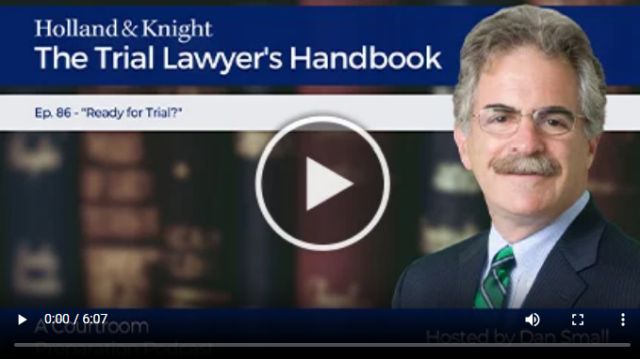Litigation attorney Dan Small unexpectedly took the lead in prosecuting the high-profile case of the Farmers Export grain elevator explosion, a major incident in Galveston, Texas, that resulted in the deaths of 18 people in 1977. In this episode of "The Trial Lawyer's Handbook," he shares this extraordinary anecdote that threw him into a panic just two years out of law school. The case's lead counsel, who was the chief of the Criminal Division at the Houston U.S. Attorney's Office, had a scheduling conflict, and Mr. Small was told the judge would not grant a continuance. The chief informed Mr. Small that another experienced trial attorney already in the area would step in, but Mr. Small soon realized this attorney was there not to lead, only to assist. So, he prepared for trial.
Listen to more episodes of The Trial Lawyer's Handbook here.
This podcast episode was adapted from Mr. Small's book Lessons Learned from a Life on Trial: Landmark Cases from a Veteran Litigator and What They Can Teach Trial Lawyers.
Podcast Transcript
Dan Small: As one of the first high-profile multiple-death criminal OSHA prosecutions, the Farmers Export grain elevator explosion case that we've been discussing in the last few episodes drew a great deal of attention in the media, the industry and the legal community. Both of the defendants retained former U.S. Attorneys. Both of them had second chair lawyers assisting them who were older and much more experienced than I was at the time. I was excited to be part of the case. I could learn a lot by watching such experienced trial lawyers.
The case was brought in Galveston, Texas, where there was a small, wonderful old federal courthouse with basically one judge, Judge Gibson. Judge Gibson was a very experienced and very strict jurist. The chief of the Criminal Division of the Houston U.S. Attorney's office was going to try the case for the government. He was a very experienced trial lawyer, which was necessary for such a complex and challenging case. I was just carrying the bags and doing the research for lead counsel. And we began to prepare for trial.
Every case has surprises. Our first one came just a couple of weeks before the trial date. The chief of the Criminal Division had an unavoidable conflict. He couldn't try the case on the scheduled date. "No problem," I said. "We'll get a continuance."
"Oh no," I was told. That's not how things work in Galveston. Judge Gibson runs his calendar very strictly, and he doesn't care much about individual government attorney's schedules. He does not give continuances. And when he says, "Ready for trial?" it's not really a question, it's an order. This case is going to trial as scheduled.
I reminded the chief how challenging this case was, legally and factually, how important this case was to the Department of Justice, to OSHA and to the families of the deceased, and how embarrassing it would be to not have an experienced lead counsel. All this I said with just a little bit of panic. "All is well," he assured me. One of the most experienced and talented trial lawyers in his office, George, happened to be down in Galveston trying a case, and he had agreed to step in. Reassured, I headed down to Galveston, checked into the government-rate hotel and went to the courthouse to meet George.
The chief's description was accurate. George was a great guy and a great lawyer. But when I finally met with him, it was apparent that something had gotten lost in communication, to say the least. What the chief did not tell me, or didn't understand, was that George was in the middle of trying a complex, multiple-defendant drug case, solo, by himself. What's more, the case was taking longer than expected. So the judge was holding them to long trial days, and the judge had announced that he would start the Farmers Export trial as soon as the jury went out to deliberate in the drug trial.
"Dan," George said, "this sounds like an interesting case, and I look forward to working with you. I'll have to take the first few days of your trial to learn about the case, but once I'm a little more up to speed, I'll be happy to try to help you in any way you tell me to."
"Help me? Help me?" The ripples of panic I had felt while talking with the chief became a tidal wave. "George," I said, "I'm just here to help you. I'm two years out of law school. I've never tried a major case before. I have no idea what I'm doing. Both defense counsels have second chairs with more experience than me. This is crazy."
George was surprised, but far too seasoned a trial lawyer to let surprises worry him. "You're a bright guy," he said. "You'll do fine. I'll help you when I can. Besides, we don't have any choice. Judge Gibson doesn't give continuances. We are going to trial, and you just have to do your best."
I called my bosses in Washington still in a state of panic, but when I described the situation, they agreed with George: "Just do your best." So I went to the little office in the Galveston courthouse reserved for prosecutors visiting from out of town, sat down and started getting ready for trial.
A couple of days later, Judge Gibson interrupted the drug trial just long enough to hold a final pretrial conference in our case. When he looked at me and said, "Ready for trial?" I understood that there was only one response: "Your honor, the government will be ready." So we went to trial. And we'll talk more about it in the next episodes.
The content of this article is intended to provide a general guide to the subject matter. Specialist advice should be sought about your specific circumstances.


